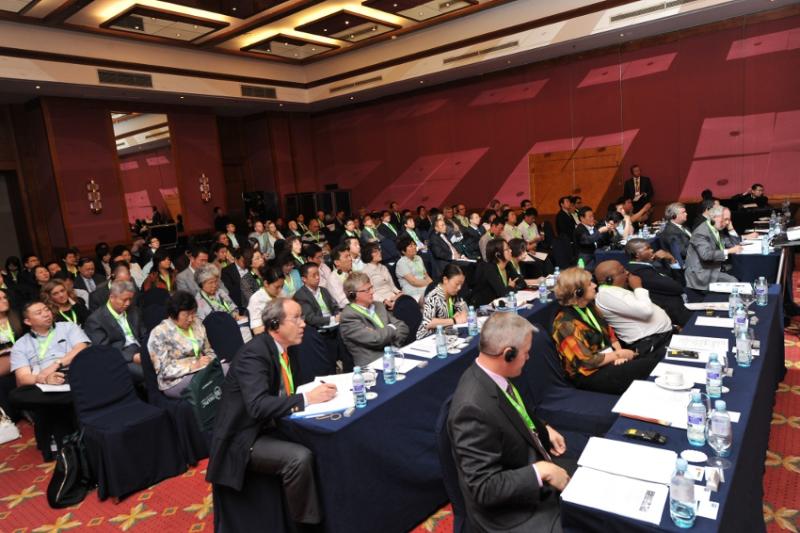Senior living in a sandbox: The China investment
If you had an empty plot of land on which to envision your senior living dream—no rules, no regulations, seemingly unlimited resources—what would you create?
Welcome to the Chinese senior housing market, where the staggering business potential is matched only by the society’s emerging middle class; where adult children have abandoned their villages in pursuit of metropolitan wealth and commerce, and must now save face by purchasing high quality care for the aging parents they left behind. And make no mistake, that’s high-end care.
“We’re going for perfection,” says David Green, director of conceptual planning and development for China Senior Care, a developer and operator based in Hangzhou, China. Green, who is also the retired CEO of Evergreen Retirement Community and pioneer of the household neighborhood concept for long-term care in the United States, says China knows it is behind on innovations with its limited LTC industry, despite a mushrooming population of seniors projected to reach 450 million by 2050. (Seniors are considered those 60 and older in China.)
This is why last December, the Chinese government announced a target of adding 3.4 million senior housing beds by 2015, and has been inviting foreign investors and operators into the market to leverage their unparalleled expertise. Likewise, large Chinese institutional investors want to pump billions of dollars into the retirement sector, but require partnerships with experienced operators to successfully execute the business.
 “To the credit of China’s leadership, they’ve recognized this is coming on quickly, and that they need to create and broadly analyze what kind of options there may be to solve it,” says Bill Pettit, president and COO of the Seattle-based assisted living company Merrill Gardens, one of the foreign operators invited by China. “There’s no shortage of capital that I think China has access to in solving and creating solutions to senior housing. What there is a shortage of is probably experience, and that comes from the generational change of having seniors cared for in villages and by families.”
“To the credit of China’s leadership, they’ve recognized this is coming on quickly, and that they need to create and broadly analyze what kind of options there may be to solve it,” says Bill Pettit, president and COO of the Seattle-based assisted living company Merrill Gardens, one of the foreign operators invited by China. “There’s no shortage of capital that I think China has access to in solving and creating solutions to senior housing. What there is a shortage of is probably experience, and that comes from the generational change of having seniors cared for in villages and by families.”
Sharing that expertise should come naturally to foreign operators, at least in these early stages, as the regulatory environment is nowhere near as comprehensive and binding as in the United States. This is why companies like Merrill Gardens and China Senior Care are reaching for the stars, planning projects that combine the best of what the West has to offer with the freedom of no rules to hold them back.
 |
China Senior Care’s prototype facility abides by feng shui principles and conforms to the household model. Rendering: Courtesy Perkins Eastman (Click here for more information on the cultural considerations that inform China’s senior housing design.) |
“The fact that there are no regulations doesn’t mean we’re trying to get around the intent of the regulations,” Green says, “because we want to do what the regulations in the United States expect to be done. Quality. Safety. But what happens with regulations is they’re interpreted differently in different judiciaries, and sometimes the way they’re written casts a net that is wider than necessary.”
As Green stresses, this could realistically be an incomparable learning experience for the United States, if a long-term view is employed—beyond the current and coming strife in Washington, beyond the cutbacks in Medicare and Medicaid. To truly change Western thinking and approaches to senior housing, “[China] can be the exact kind of opportunity that we need in the United States to do the extreme planning that’s necessary,” Green says.
CREATING THE MOLD
A lack of Chinese senior housing regulations today does not mean there will be this much freedom in the decades to come. The standards will eventually be set after operators succeed or fail, says Serena Xie, managing director of Emeritus Senior Living’s venture in China, Cascade Healthcare, which opens the country's first foreign-owned, for-profit senior care facility in Shanghai this spring. “It’s exciting, in a way, that hopefully we can help influence the regulators in this industry to design a system that incorporates the best practices from abroad,” Xie says.
But what should the delivered services look like? Xie says there is the opportunity to provide more medical care in China’s senior living communities, as opposed to the strict divide between U.S. assisted living and skilled nursing facilities.
Actually, such arbitrary designations should be meaningless in China, Green forecasts. “The line between [assisted living and skilled nursing] is inconsequential,” he says.
The accommodations will likely resemble Western assisted living facilities more than nursing homes, but also be larger, Green says, and there should be a focus on dementia care because “that’s an area where we know how to do it well and we can knock their socks off.”
“We expect maybe even a majority of the people to come in for dementia care because hospitals don’t want people with dementia. They won’t even admit them,” Green says.
With a handful of his own projects in motion, Pettit says the initial properties should be more oriented on care and less adaptive on lifestyle. He also warns that foreign entities should exercise caution in terms of forecasted penetration rates and the assumption that their senior housing solutions will be adopted immediately. “In China, it would be a mistake to merely assume the market is going to mirror what we see today in the United States after 20 years of refining the model and method and services,” he says.
That being stated, a growing audience of foreign investors and operators is eager to participate, says Romilly Sinclair, creative director at international events company IMAPAC, which orchestrates the annual Retirement Living World China conference.
|
Last year’s event, the inaugural Retirement Living World China 2011, drew a global crowd of 170 C-level executives from senior living development, international investment, private equity and insurance, and IMAPAC expects more than 200 delegates at the next show on May 28 in Shanghai. “When we investigated the industry, we found that international developers and operators knew about China’s potential, but they hadn’t gone into China because they weren’t sure about regulations, market entry, business models and finding suitable business partners,” Sinclair says.
That mood is quickly changing, Sinclair says, because the sector is actively encouraging foreign involvement, and the Chinese consumer market has a preference for international brands. “You only have to look at the success of the international hotel chains,” which became modernized and exceedingly popular in China over the past 15 years, Sinclair notes.
BARRIERS TO ENTRY
With so much potential, the state of China’s senior housing market must be too good to be true, right? Well, not exactly, but there are some challenges to consider. As Xie says, many operators may find the lack of clear policies or procedures on the regulatory and business fronts to be an unfriendly complication. Some may also see the language barrier to be insurmountable. Then there’s the approval process Cascade Healthcare had to go through with the Shanghai government to open its 100-bed skilled nursing/short-term rehab facility.
Cascade Healthcare is scheduled to open this 100-bed skilled nursing/short-term rehab facility in May 2012. Rendering: Courtesy Cascade Healthcare |
“There was a significant amount of work being done ahead of us submitting the licensing package,” Xie says. “Once we submitted the application, it took less than two months to receive all necessary approvals. Being the first company to receive the foreign invested senior living license in China, it was definitely a breakthrough.”
It’s a breakthrough that impatient players in the industry may never replicate. Green says doing business in China is a “huge undertaking” and requires a sacrifice of resources without expectations of immediate return on investment. “The Chinese will eat you up if you try to go in there and just make money and think you know what you’re doing, introducing your U.S. product. You’re almost certain to fail,” Green says.
He uses the example of independent living and real estate development, which the Chinese “will beat you hands down on because that’s their business. They don’t want to operate these facilities—they want to develop them.”
And senior housing alone, as in the United States, is not going to solve the entire dilemma of an aging population, Pettit says. “What I do know is that we have a successful industry [in America], and in China, with 10 times the number of seniors, even a 1 percent penetration rate is going to positively impact a large number of seniors,” he says.
Sinclair argues that this cautious, yet positive, long-term view espoused by both Green and Pettit touches on why many operators stay in this business: to provide quality, necessary elder care. “The humanitarian aspect shouldn’t be forgotten,” Sinclair says. “International operators can really improve the lives of many older people in China. The standards and regulations by which they operate on a daily basis in America ensure the safety and well-being of their residents. By bringing these same standards to China, they can improve the comfort and safety of millions of Chinese seniors.”

Kevin Kolus wrote for I Advance Senior Care / Long-Term Living when he was an editor. He left the brand in 2012. He is now senior communications manager at Cleveland Clinic.
Related Articles
Topics: Articles , Finance , Housing












